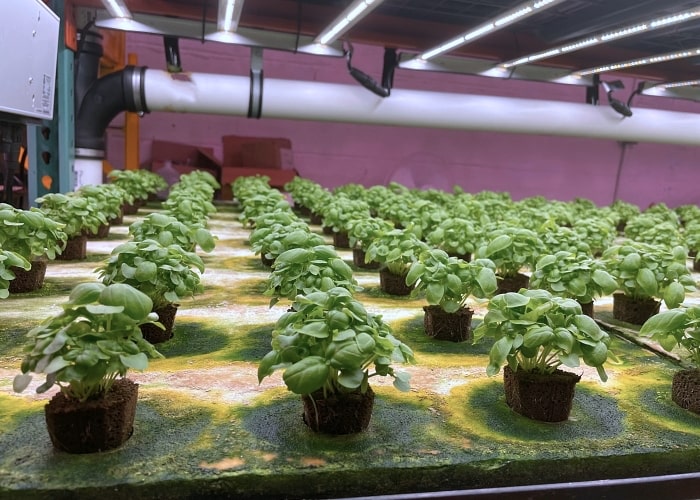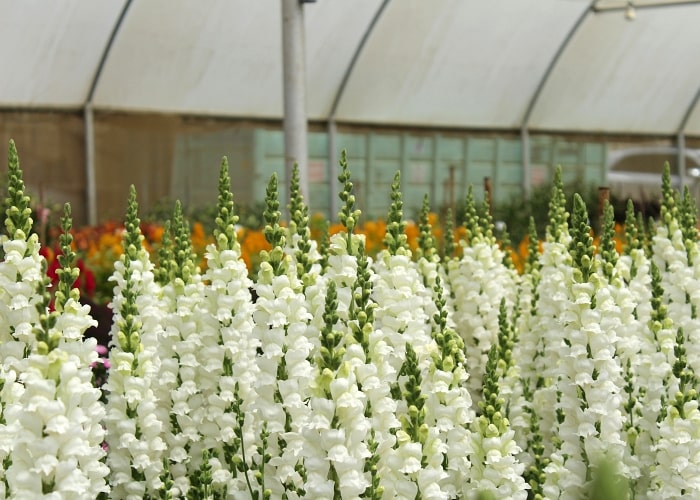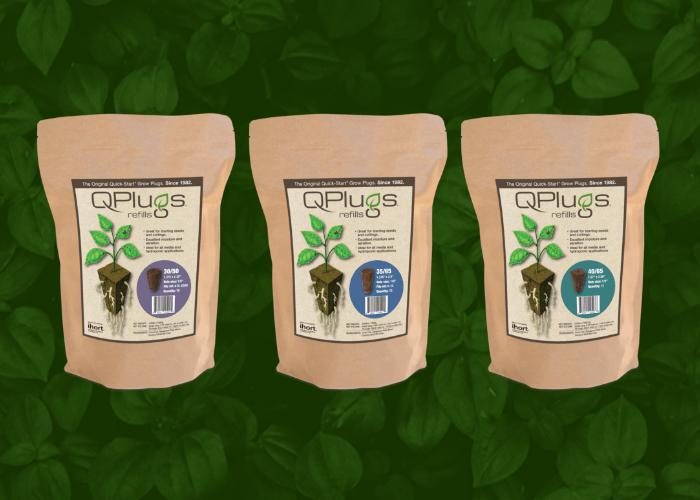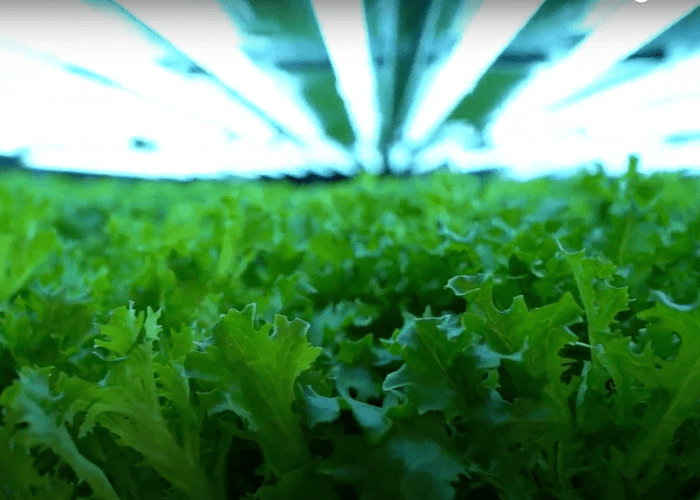Closed-loop agriculture, also known as closed-loop farming or sometimes circular agriculture, is an approach to food production that optimizes resources and minimizes waste. The system is designed to be regenerative, sustainable, and environmentally friendly.
The approach can be utilized across all types of production systems. The key characteristics and benefits are similar at their core but may differ slightly in implementation based on the system.
Key Characteristics and Benefits of Closed-Loop Farming
Focus on Energy Efficiency
Closed-loop production systems are carefully managed to optimize their energy use. Depending on the type of system, this may include using renewable energy such as solar, wind, or biomass and improving energy efficiency through different processes.
- Indoor farming and controlled environment agriculture (CEA) systems may use energy-efficient LED lighting to provide adequate light for plant growth while minimizing energy consumption.
- Products may properly insulate buildings, greenhouses, and other infrastructure to reduce energy loss and maintain stable internal temperatures.
- Crop farmers may use GPS technology for precise planting, harvesting, and other field operations to minimize fuel use and improve efficiency.
Reusing and Recycling Resources
Closed-loop farming systems prioritize resource recycling by reusing needed resources instead of discarding them. Nutrients, water, and other inputs are carefully managed and recycled within the system to minimize waste. This contrasts with a linear production system, where resources are used and discarded.
- For example, crop residues or organic waste may be composted and returned to the soil.
- Hydroponic operations may capture excess—or even used—nutrient solution and then recirculate and reuse it, minimizing wastewater and reducing their input needs.
- Many closed-loop food production systems are also designed with recyclable materials, facilitating the recycling process at the end of their lifecycle and reducing waste generation.
Minimal Environmental Impact
Circular agriculture also works to minimize the use of external resources because of the pollution associated with their production, transportation, and application.
A prime example is reducing the use of conventional fertilizers. During the manufacturing and transport of nitrogen fertilizers, tremendous carbon emissions are released, and the products have a potential risk of leaching into and contaminating water sources.
Closed-loop farming often involves practices such as organic farming, agroecology, and sustainable land management to minimize resource use and the related negative environmental impacts.
- Organic fertilizers release nutrients more slowly than synthetic products, which can keep them from leaching and negatively impacting water sources.
- Agroecology may encourage natural pest predators to enter an area as biological control of problematic insects instead of applying chemical insecticides.
- Sustainable land management may improve soil fertility by increasing organic matter and fostering beneficial soil microbes, which in turn reduces the need for fertilizer.
Integration of Components
Another critical part of circular agriculture is integrating different production components into an operation to create a holistic and synergistic system. Outputs from one piece serve as inputs for another.
For example:
- Farmers may combine crop production and livestock farming, creating a synergy through waste management. Crop residue is fed to the livestock instead of being disposed of, and livestock waste can, in turn, be used as a fertilizer source for the crops.
- Aquaculture is a prime example of the integration of components in indoor food production systems. Fish waste adds nutrients to the water, which the plants use; the plants, in turn, filter the water, keeping it clean for the fish.
Water Conservation
Water is managed efficiently in closed-loop agriculture to reduce total consumption and runoff.
Common conservation practices include:
- Soil moisture sensors track the soil’s moisture content in real-time. This data allows farmers to irrigate only when necessary and avoid overwatering.
- Cover crops and organic mulch help reduce evaporation and improve soil moisture retention. They also suppress weeds that compete with agricultural crops for water resources.
- Planting crop varieties that are genetically adapted to local conditions, including drought-tolerant traits.
- Adding organic material to the soil or using stabilized growing media in soilless systems to improve water retention around the roots.
Regenerative Agriculture
Closed-loop agriculture often embraces regenerative practices to improve sustainability.
Regenerative agriculture is an approach to farming that focuses on restoring and enhancing the health of ecosystems, soil, and biodiversity. Its goal is to sustain the land and improve its condition over time by promoting sustainable and resilient agricultural practices.
This may include:
- Planting cover crops between cash crops protects and improves soil health, prevents erosion, and adds organic matter.
- Minimizing or eliminating tillage to preserve soil structure, enhance water retention, and reduce soil erosion.
- Plowing along the land’s contour lines minimizes water runoff and promotes soil water retention.
Localized Food Production
A closed-loop system prioritizes localized food production. Growing food locally reduces long-distance transportation and the associated environmental impacts of hauling goods, creating a more closed-loop model.
It’s estimated that when combined, a single meal’s worth of food travels, on average, 1500 miles from the farm to the consumer. This lengthy transport equates to a significant amount of fossil fuels used by the semi-tractor or trains to cover that distance and substantial greenhouse gasses emitted in the exhaust.
How Can IHORT Products Further Benefit Closed-Loop Farming?
Closed-loop agriculture is pivotal in shaping a more sustainable and resilient future for our food systems. The benefits are seen across many production systems, including crop farming, greenhouse production, hydroponics, and aquaponics.
IHORT products give growers more sustainable cultivation solutions to help them reach their closed-loop goal.
- The thermal mass of IHORT’s stabilized growing media in trays helps to buffer temperature changes in the root zone. Less energy is needed to keep the environment at an optimal temperature.
- Our products’ unique soil handling process and cutting-edge technology contribute to superior water control and help improve water use efficiency in indoor growing systems.
- Q Plug and Excel Plug products maintain their shape, potentially eliminating the need for plastic pots or containers in indoor systems (hydroponics and aquaponics) and improving resource efficiency.
- Since our stabilized soil growing media doesn’t break down, the particles don’t clog filters in recirculated systems, making production more efficient.
A Recipe for Sustainable Success
IHORT is one of the leading suppliers of stabilized soil media for growing applications. With decades of experience, we have become the premier innovator in propagation media. We are committed to providing the best, most innovative solutions that help create a closed-loop growing system.
No matter your production needs, the IHORT team is here to help you grow! Contact us today to discover how our premier propagation products can improve your resource efficiency and help build sustainable agricultural systems.




